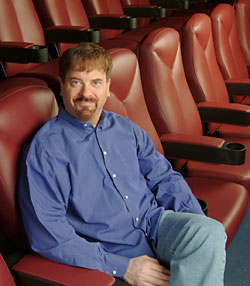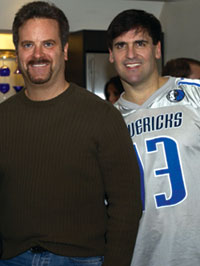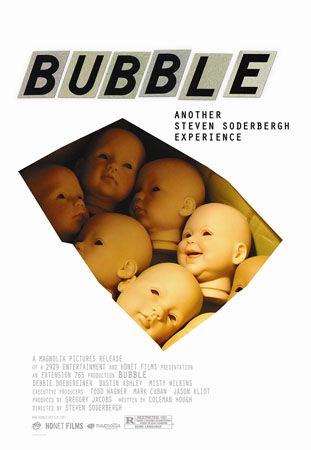 Things are changing. The old models of entertainment distribution and consumption have already undergone a sea change in the last decade, and Todd Wagner and Mark Cuban think this is just the beginning. Their 2929 Productions is looking to change the whole paradigm of how new movies are released, getting rid of the window of theatrical exclusivity. Their first effort is Steven Soderbergh’s experimental film Bubble (my review here), which came to theaters on Friday – and played on the HDNet Channel (which Wagner and Cuban own) that same night. On Tuesday it’s being released on DVD. It would have hit stores on Friday, most likely, but new DVD day is historically Tuesdays.
Things are changing. The old models of entertainment distribution and consumption have already undergone a sea change in the last decade, and Todd Wagner and Mark Cuban think this is just the beginning. Their 2929 Productions is looking to change the whole paradigm of how new movies are released, getting rid of the window of theatrical exclusivity. Their first effort is Steven Soderbergh’s experimental film Bubble (my review here), which came to theaters on Friday – and played on the HDNet Channel (which Wagner and Cuban own) that same night. On Tuesday it’s being released on DVD. It would have hit stores on Friday, most likely, but new DVD day is historically Tuesdays.
A lot of people are upset about this. A lot of people are scared about the effects day and date releasing will have on the movie industry, especially movie theaters. A couple of weeks ago Todd Wagner was in New York City promoting Bubble with Soderbergh and I had a chance to talk to him about this model he’s trying to create. Although maybe trying is the wrong word – as Wagner says in the interview, this is happening. If not with 2929, it will be with someone else. He couldn’t say who, but he told me that a major studio has been sniffing around, looking to attempt a day and date release in the near future. I wonder if it’s Universal – they had some serious success in the last year with their new line of direct to DVD films.
The debate over day and date releases is one of the most important things going on in the movie business today. CGI and the newfangled 3D process that so many directors are smitten with are just gimmicks, while day and date releasing could very well completely change the way we experience movies.
Q: You’re beginning this new day and date venture with a name director, but with an experimental film, the kind of film that probably wouldn’t find a wider audience with a regular release pattern. Were you hoping that Steven would bring something more like Ocean’s 11 to the table?
Wagner: I think in anything like this it’s one step at a time. Part of the reason we did this in the way that we did it is that if we had come out with this announcement at Tribeca in May and it had been a director you had never heard of, you wouldn’t be sitting here today. We did this purposefully. If you’re doing this with Steven no one can dispute he’s an A-list director, no one can dispute he’s an Academy Award winning director, nobody can dispute that he’s talented, and important to us – no one can dispute that he can make large budget or small budget, that he’s an artist and that he gets technology.
That was a part of this, that Steven will be able to create six different movies. And they will be different. From our perspective it’s the opportunity to be just as creative and entrepreneurial on the other side, so it’s the marriage of that together which is that he’s got the freedom to create different projects and we have the freedom to distribute them in a way that makes sense today.
Q: What’s the time frame for the six films?
Wagner: He’s going to do them between some of the bigger projects, so it will be off and on in the years ahead. The good news for us is that we have two production companies – the HDNet Production Company, everything we make there will be released in this manner. So this calendar year we hope to have six or seven movies to release in the way we’re releasing  Bubble. So we view Bubble as this great opportunity because obviously we wouldn’t be sitting here if it wasn’t Steven, and because it draws attention to the process, which is what we’re trying to do. We’re trying to draw attention to the fact that I think the system doesn’t make sense. We are doing this to try to listen to the consumer.
Bubble. So we view Bubble as this great opportunity because obviously we wouldn’t be sitting here if it wasn’t Steven, and because it draws attention to the process, which is what we’re trying to do. We’re trying to draw attention to the fact that I think the system doesn’t make sense. We are doing this to try to listen to the consumer.
To me this is all about listening to the consumer. This is about the reality that the world has changed, that it is a digital world, and we want to be the ones that are responding to those changes. By the way, if we got out a chalkboard and wiped it clean and you didn’t have any preconceived notions about how movies should be distributed, I bet I have a decent chance of showing you why it makes more sense than the way it is done now.
Everybody has bought into, ‘It’s a window, it’s sequential, it maximizes this…’ Come on, do you think they sat down sixty years ago and figured that out? They didn’t. It was a theater. That was it. And then this thing called television came along – which, by the way, they fought – and everybody was like, ‘Well, OK fine then I guess you’ll see it on TV someday too.’ And then this called the VCR came along – which, by the way, they fought – and then, ‘OK, fine, you’ll be able to get it on VCR.’
Come on, this is the natural progression of things when you are upending an apple cart that frankly deserves to be upending. Mark and I are just whatever enough to say it doesn’t have to be that way and Steven is a great partner to do that with.
We already have the test case right now – it’s called the music industry. We can walk through it together for a second. We all know Napster, we all know what happened with Napster – it got litigated out of existence. Steve Job came in the wake and created a whole industry. But let’s look at the last year. CD sales went down by like 12% last year in the music industry. Oh my God, that’s horrible, right? No. Because digital downloads went up 150%. There were like 350 million digital downloads last year. There were over a billion pieces of music purchased last year – the highest the industry’s ever had. But you have to think about it differently. And a third revenue stream – which I never would have thought of, and good for you if you would have – which is ring tones. Would you have thought people would have paid a buck fifty to hear a piece of a song on their phone? You know what, I would bet no, but the consumer has said ‘We want that.’
Now they have three ways to sell that same song, and they’re selling it to different devices. That’s exactly what we’re saying with the movie industry. I don’t want to try to decide, nor should, how a consumer consumes it. I want to get it out there and let you decide. Now, I may price it differently so that you have to pay for the luxury of having that DVD at home when it’s still in the theater, but you still have that choice, and that’s what it’s all about in my opinion.
Q: You own the Landmark Theater chain. As a theater owner why would you want to book a movie that is also available at home and risk having it play to empty seats?
Wagner: This is the ultimate point where we agree or agree to disagree, and it all comes down to how you view the world. We are theater owners – we own 60 theaters. I am in the exhibition business, and I get what the exhibition business is. The biggest change was back when people could get the movies at home. Now we’re just talking about will it come home in six months, in three months or in a couple of days, and now you’re saying that’s really bad for exhibition. I would say what was really bad for exhibition happened sixty years ago, if that was going to kill it.
We’re just speeding along a process – that by the way is already happening, whether we at 2929 do it or not – it’s going to happen. One of the things that I would say that we have done with exhibition is that we are giving 1% of the DVD sales back to the theater. The exhibition industry, the bane of the industry for the last thirty years is that we get people to theater and then we don’t share in any of the downstream revenues. That’s BS. All we sell is Cokes and popcorn, and we get an ever decreasing percentage of the ticket sales.
We’re saying that this is BS and the exhibitors should participate in the downstream revenues because they are a valuable partner. We are giving them – without being asked – 1% of the DVD sales to all theaters that participated. While you may say that’s not a big number, if you did the math with me, trust me – 1% of the DVD sales of all the movies that have gone through a theater in the last year is big. And it’s helpful to an industry that has razor thin margins. The exhibition industry is a tough industry.
DVD sales to all theaters that participated. While you may say that’s not a big number, if you did the math with me, trust me – 1% of the DVD sales of all the movies that have gone through a theater in the last year is big. And it’s helpful to an industry that has razor thin margins. The exhibition industry is a tough industry.
I would argue that it’s not an attack on exhibition. It’s not a terrible thing for exhibition. In fact, it could be a great thing for exhibition. It’s a new revenue stream. I would argue to you that 5-10% of people are regular moviegoers anyway. We’re going after the other 90%. That’s who I want. I want the people who aren’t going to the movies and five months later when it comes out on DVD, they don’t care. They’re on to the next thing. Those are the majority, and that’s where we’re heading. That’s what this is all about.
Now, no question we’re trying to make the exhibitors happy by sharing in the downstream revenues and showing them this is something that will make all boats rise.
Q: Speaking of that majority, a film like Bubble would normally be released in New York and LA and never hit the rest of the country. This day and date release allows people outside the main markets to get this movie months before they normally would.
Wagner: I think that’s a beautiful point. One of the things that bothers me, now we’re on art house and specialty film, is that the assumption is made that only people in New York and LA want to see that product, so the movie only opens in New York and LA. The assumption is that people in Houston and Dallas and Seattle and Chicago don’t want to see this product, and I don’t think that’s true. The beauty of this program is that in markets where it’s not in their local theater, they can go to the store and get that movie and watch it as well.
What we’re learning in this process – and we’re just learning – is that this is a way to get it to people so that if they do want it they can watch it on TV, if they have HDNet Channel, or they can go to their retailer and buy it, and they don’t have to be in one of those cities that plays it. I can’t tell you how many people in Florida want to know when certain movies are going to come, because there aren’t a lot of art house theaters. Are they going to drive to Atlanta? It’s ridiculous. So this is a way that that movie – the person has the choice to see that movie.
Q: When people are able to get movies day and date on DVD, will it become a situation where only big, expensive films are getting made? Films like King Kong that will entice you into having the theatrical experience.
Wagner: What’s funny is that I have been asked this in both directions – will this day and date thing only work for big movies, or for small movies or for – I don’t know. None of us know for sure.
It’s like if we’re in the music industry and saying, ‘Oh let’s put that single out but let’s not give them that one.’ I don’t want to make that choice and I don’t think we should. I think that’s a dangerous road to get on. Consumers will tell us. And it goes back to the model – if consumers are happy (and I don’t think you can dispute that consumers will be happier if they can get things the way they want it), now it’s the cost structure. If I tell you that by doing this digitally we have lower print costs – so that’s two thousand bucks a screen, and if it’s a wide release, that’s six million dollars just wasted. If I say that advertising, which is the huge number studios spend, and instead of spending it once they spend it again to try and get you to buy the DVD, if I know tell you we only have to have one spend, I would argue that’s another savings. I would argue that we have taken a big bite out of the costs of making movies. Now, whether you buy it or don’t buy into my revenue argument, that’s another thing. But if indeed I am right, and people still want to go to the movies – I own a piece of the Mavs, right, and I can go to a Mavs game or I can watch it on TV… it hasn’t impacted that sport. When television came about fifty years ago, they said professional sports would be killed and now it’s the biggest revenue generator. I think the same argument applies here – we like to get out of the house, we want to go out and do things. If I could get those people in their 30s, 40s and 50s who have disposable income, then that, to me, is a win from the revenue side. I’ve reached a bigger audience and given them a choice how to see the movie as well.
Now, whether you buy it or don’t buy into my revenue argument, that’s another thing. But if indeed I am right, and people still want to go to the movies – I own a piece of the Mavs, right, and I can go to a Mavs game or I can watch it on TV… it hasn’t impacted that sport. When television came about fifty years ago, they said professional sports would be killed and now it’s the biggest revenue generator. I think the same argument applies here – we like to get out of the house, we want to go out and do things. If I could get those people in their 30s, 40s and 50s who have disposable income, then that, to me, is a win from the revenue side. I’ve reached a bigger audience and given them a choice how to see the movie as well.
Whether it works with this movie or that – I don’t know. But I will say this, let’s look at what’s happening in the last 90 days. Robert Iger, the president of Disney, publicly saying the [DVD release] window should potentially collapse. Followed up by announcing a deal with Apple to do video iPods so you can buy Desperate Housewives the next night. Followed up by ESPN, another Disney company, just this week announcing the release of a theatrical movie, and 30 days later you can watch it on ESPN, 2 days later they’ll sell you the DVD. Fox announcing just this week that hi-def DVDs will be available 60 days after theatrical. They’re doing it. They’re doing it piecemeal, they’re taking a stab, but we’re just going all the way.
So where it settles out, I don’t know. I’m not saying we’re right, but we have the flexibility to experiment and see where it shakes out.
Q: Do you think it’s possible that day and date releases could force the exhibitors to change their policies to make theaters more friendly to serious film fans, changing the theatrical experience from something to do when you’re bored into something a little classier?
Wagner: That’s assuming it will cannibalize the business a lot more than I think it will. You’re assuming that people only go to the movies because they just can’t get it anywhere else, that if I could watch it at home I don’t go out of the house. To me that’s like saying because I have food at home I don’t go to a restaurant. You’re assuming something that I don’t know if you’re right – only time will tell us – but in my gut I don’t think is true.
Will a small segment potentially say they want to just see it at home? Maybe. But they’re going to have to pay for it, first off. It’s still the most economical choice, going to the movie theater. And again, you’re at home. Are you going to stay at home every Friday night for the rest of your life? You want to go out. I think it’s still one of your entertainment choices, and I think you’re going to want to explore it.
And I’m saying that we can offset it with the 1% downstream revenue share.
Q: How about piracy in regards to day and date? When a movie comes out now I can go to Canal Street the same day and get a bootleg copy, but it’s usually a guy with a camera in the theater. If the DVD is coming out the same day, you’re opening up digital quality piracy issues.
Wagner: I sit on the board of the American Film Institute, and I got put on the spot one meeting when they asked me to talk about this, and it was before it was real public. Jack Valenti sits on the board with me, and Jack as you know, is adamant about piracy. He’s the one who made the infamous VCR quote back when they came out, and I thought he would be all over me. He loved it. He said it was exactly what we ought to do.
Yes, what you’re saying is accurate, but I will argue just as vehemently from the other side is that what we’ve learned from Napster and now iTunes is that if you actually give it to people, most people want to be a paying customer. They don’t want to steal. Having said that, there will always be a segment of the population who will do that, people who have more time than money. It’s called college, it’s called high school. Are they going to share it with their friends? Of course they are. And that’s just the way of the world. I’m not going to spend time worrying about that. I argue that it provides marketing and promotion.
that what we’ve learned from Napster and now iTunes is that if you actually give it to people, most people want to be a paying customer. They don’t want to steal. Having said that, there will always be a segment of the population who will do that, people who have more time than money. It’s called college, it’s called high school. Are they going to share it with their friends? Of course they are. And that’s just the way of the world. I’m not going to spend time worrying about that. I argue that it provides marketing and promotion.
It all comes down to your point of view. I come from the technology field. Microsoft loses more money to piracy every year than the entertainment industry does. How many people have shared their copy of Windows with a friend, or Office or Outlook? But they also know that they’re getting mindshare as well. It’s always a balance.
My past life is the internet. I started a company called broadcast.com. That’s how Mark and I made the money to do what we do today. We were the first ones to stream audio and video over the internet – first ones in the whole world! Ten years ago. Now ten years later, that’s no big deal. It was a huge deal in 1995! It was enormous. I used to give speeches in 1998, before we sold to Yahoo!, talking about a digital world. Now it’s seven years later and I think the words make more sense to people than it did then. View the world as a big iceberg. Our world is the ten or twenty percent of the iceberg above the water. That’s where we derive our revenue from, this ten or twenty percent. We think about things literally, sequentially, in an analog way.
I think in a digital world we’re going to find that 80 percent of the revenues are down here and we haven’t even tapped them yet. That’s where the music example comes in – we have three revenue streams instead of one, and there are going to be three more that I haven’t thought of that are going to happen. My view is that this world now, we don’t know all the ways we’re going to monetize things. Pay per views, pay per clips, downloads, personalizable, customizable – all of these things are going to come when we think about it differently.